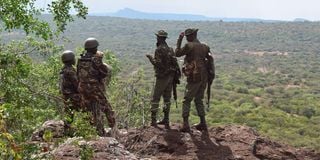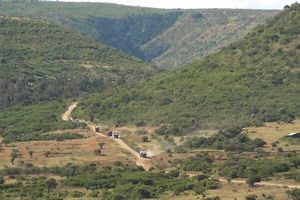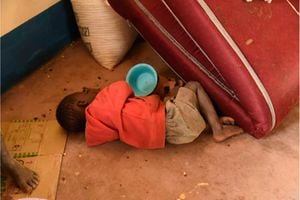
Police officers on patrol in Samburu.
On the morning of October 18, 2013, armed attackers descended on Kawap village in Baragoi, Samburu County, making off with thousands of cattle.
Fearing for their safety, the villagers fled to Logetei in Lonyangaten sub-location, dozens of kilometres away. This led to the closure of social facilities, including Kawap Primary School and a dispensary.
After the locals left, the armed criminals vandalised and torched their houses and structures in the shopping centre, including shops, the Kawap ECDE centre, Kawap Primary School, teachers' quarters and a borehole. They also destroyed the Catholic Church and the Administrative Police camp.
Aloyce Losike, an elder from the area, said the entire Losurkoi sub-location, which had more than 132 homes, had been abandoned for more than a decade due to inter-communal conflicts.
Residents have yet to return to their homes because the area is insecure and there are no police officers to provide security.
“We are willing to return to our homes and rebuild our lives, but it seems the government is uncommitted to resettle us. As we speak, the entire Losurkoi Sub-Location has remained deserted for over a decade, and security officers have not been deployed to restore sanity in the banditry-prone area despite our numerous calls,” Mr Losike said.
“It seems there are people with vested interests... We have done everything possible, but it hit a dead end. As we speak, locals and their chiefs are scattered in other areas as refugees, and others have migrated to Maralal town, Isiolo, and Laikipia counties for safety. It is more than 11 years since our homes were left desolate.”
Locals are now appealing to the government to rebuild the demolished schools and dispensary, rehabilitate the borehole and deploy security officers in the abandoned village to allow them to return to their homes.
“The government is rebuilding schools that were vandalised by armed criminals in the North Rift Region, and Kawap Primary School and ECDE were not considered. We appeal to the State to resettle us in our homes and reconstruct the destroyed schools and other social amenities,” said Mr Losike.
“It is a shame that more than 60 years after independence, we are still displaced from our homes due to archaic stock theft and banditry. Following the flare-ups, some of our children dropped out of school after their institution was shut down and later demolished by criminals.”
According to the elder, before the mass exodus of locals from the troubled village in 2013, Kawap Primary School had more than 153 pupils, while the ECDE centre had 180 learners.
Moses Modo, an administrator and cleric from the area, said the flare-ups in Nyiro sub-county started in 1996 before escalating over the years, leading to mass displacement of people in 2013.
“The inter-communal conflicts escalated from stock theft to killings, forcing people to flee their homes. The Kawap Location had three Sub-locations -- Lonyang’ate, Nakwei, and Losurkoi. As we speak, only Lonyang’ate, adjacent to the Baragoi location, is inhabited by people, while the other two have been deserted for more than a decade due to insecurity,” said Bishop Modo.
“The locals are yet to go back to their homes because their homes, schools, and shops were vandalised and torched. A dispensary and a borehole were also vandalised. The area is in ruins and families have been reduced to paupers after their livestock, which was a major source of livelihood, were stolen by raiders,” he added.
Samburu North Deputy County Commissioner Geoffrey Waini said there had been mass raids in the area involving neighbouring communities. However, the trend has reduced in recent years due to efforts by the government and peace actors to restore sanity.
“The worst raid that happened in this area was in 2012, which saw more than 49 security officers and other village elders who were on a mission to recover thousands of stolen livestock killed in an ambush in Baragoi. However, relative calm is returning to the area due to peace efforts,” said Mr Waini.
However, the recovery of stolen livestock in the area is hampered by poor transport and mobile phone networks.
Mr Waini added that the rampant raids and killings in the area have affected learning, especially when villagers flee their homes.
“The entire Kawap village has remained deserted since 2013 due to inter-communal conflicts that lasted more than three days, forcing the residents to flee the area for good. From that time to date, if you visit that area, it is just in ruins. You will see some structures that tell you there was a school, a dispensary, and even a borehole, all of which were destroyed by the attackers. The whole village is deserted,” said the deputy county commissioner.
He claimed that the Morwakiring Sub-Location is also deserted due to incessant flare-ups.
He said the constant threat of insecurity, which has led to criminals ambushing motorists, has also hampered public transport and caused the high cost of food in the area.
“Some areas here are still porous as some criminals ambush motorists on the Maralal-Baragoi road. The cases are rampant between Marti, Morijo, and Mlima Blue areas, a move that has scared away development partners and investors, leaving the area lagging behind in development,” he added.
However, he said the state has stepped up efforts to restore sanity in the affected area by intensifying patrols and deploying more security officers and armoured vehicles.
According to Inter-peace Country Director Hassan Ismael, illiteracy is the biggest obstacle to peace efforts in the North Rift region, where young boys who should be in school are being recruited into banditry.
“The major impediment to peace in Suguta Valley is illiteracy. Close to 95 percent of the population has never attended school... It’s an issue we are working on with the county and national governments and the military to ensure that access to education is addressed,” said Mr Hassan, who recently toured the area.
He called on the county and national governments to roll out development projects in the affected areas, which he said have lagged for many years.
“For instance, the Chemolingot-Kapedo-Lokori road is the shortest route to Lodwar and even South Sudan and would open up this region as an economic hub if tarmacked,” he said.








